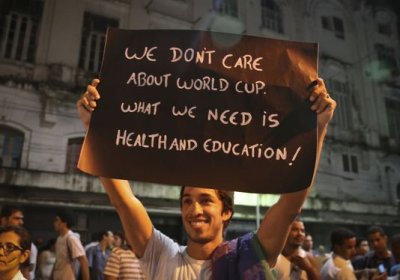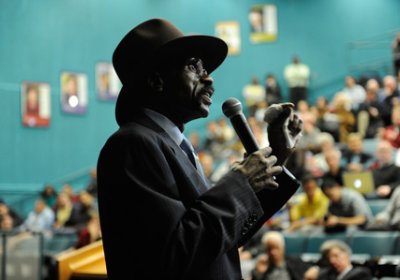Before returning to the favela (local neighbourhood) Vila Autodromo for the first time since 2012, I had already been told that the community would not look the same. As a friend said to me, “It will resemble a perfect smile with several teeth knocked out.”
Vila Autodromo is just yards away from the site of the 2016 Rio Olympic village. Olympic planners, as well as building interests, have long targeted this close-knit community for demolition.
Dave Zirin
It is understandable that Brazil's President Dilma Rousseff has come out swinging.
Given that strikes, land occupations and protests are ripping out across the country in advance of the World Cup; given that a Pew Research Poll found 67% of the country is dissatisfied with her handling of the tournament organising; and given that Rousseff faces an election later this year, she is fed up and ready to play the conspiracy card about the turmoil gripping the country.
There are plenty examples of sporting “droughts”, but there has never been a more harrowing athletic drought — rife with pain, pathos and perseverance — quite like that of the Palestinian national football team.
This is a national team without a recognised nation to call home; a national team that has never qualified for a major international tournament; a national team that, like its people, struggles to be seen. That drought, 86 years in the making, is now over.
By criticising the 2014 World Cup and the spending priorities of the Brazilian government, Brazilian football legend Pele has accomplished the rarest of feats in 21st century sports media: he has shown the capacity to shock and surprise.
“It’s clear that politically speaking, the money spent to build the stadiums was a lot, and in some cases was more than it should have been,” Pele said during a lecture at Anahuac University in Mexico City.
For people just tuning in, the idea that people in Brazil would be protesting the 2014 World Cup makes about as much sense as New Yorkers' rebelling against pizza.
And yet here we are, less than one month before the start of the Cup, and demonstrations bear the slogan #NãoVaiTerCopa, or "There will be no Cup".
For a man who spent nearly four decades of his 76 years under the restrictive eye of the United States correctional system, few have ever touched as many lives as Rubin “Hurricane” Carter. The world-class boxer-turned-wrongfully accused prisoner-turned-advocate for the rights of the unjustly jailed succumbed to cancer on April 20. But his memory and work will endure as long as there are people outside and inside the prisons of the world fighting for justice.
The experts said that the efforts of the Northwestern University football (gridiron) team to form a union would crash and burn.
The experts scoffed that these naive jocks would lose their case before the National Labor Relations Board (NLRB). The experts all believed that this is what they call “settled law”.
Their names are Jawhar Nasser Jawhar, 19, and Adam Abd al-Raouf Halabiya, 17. They were once soccer players in the West Bank. Now they will never play sports again.
Jawhar and Adam were on their way home from training in the Faisal al-Husseini Stadium on January 31 when Israeli forces fired on them as they approached a checkpoint. After being shot repeatedly, they were mauled by checkpoint dogs and then beaten.
Ten bullets were put into Jawhar’s feet. Adam took one bullet in each foot.
Since their founding in 1896, every Olympics has arrived with the promise to unite the world.
One can still hear the lyrical words of the man who presided over the 1936 Berlin games, Chancellor Adolf Hitler, who said that he hoped his Nazi Olympics could help “knit the bonds of peace between nations”.
Hitler’s dreams of using the vessel of what is known as “the Olympic Movement” to create a harmonious world has tragically never come to pass, despite the best efforts of the aristocrats in the International Olympic Committee.
There are times when the line between shock, rage and sadness become so blurred it is impossible to know when the flow of emotion ends or begins.
The shock and rage come from hearing about an African-American student violently tormented by his three white housemates at San Jose State University in California. Thrown together randomly as first-year students tend to be, Logan Beaschler, 18, Joseph Bomgardner, 19, and Colin Warren, 18 found common cause in acts of racist sadism against their fourth housemate.
The New York Yankees of Egyptian football, Al Ahly, have officially expelled one of its top players, striker Ahmed Abdel Zaher.
Did this extraordinary act take place in the aftermath of a heartbreaking loss? No, the team had actually just triumphed 2-0 and Zaher had even scored a goal.
Was there an off-field scandal? Did Zaher find himself caught with steroids, or bullying teammates or running a dog-fighting ring? None of that. He was, by all accounts, a model citizen.
Your 14-year-old daughter is dumped on your freezing front lawn in a state of chemically induced incoherence with her shoes off and frost stuck in her hair. She tells you she was raped. You hear her 13-year-old best friend was also raped that same night.
Your daughter is then bullied as a tape of the incident passes around her high school. You wait for the indictments and some semblance of justice, but one of the accused is a football star from one of the area's most prominent and politically connected families.
- Previous page
- Page 5
- Next page










